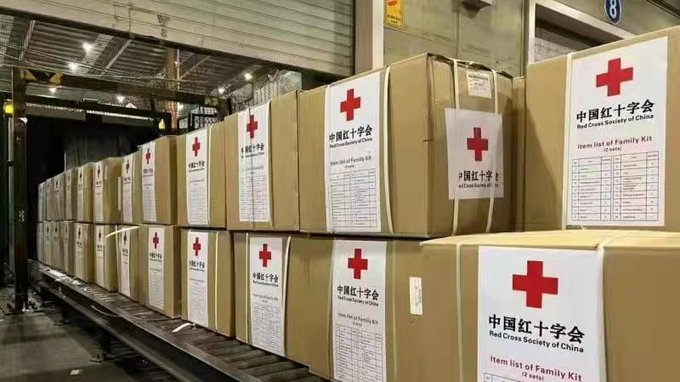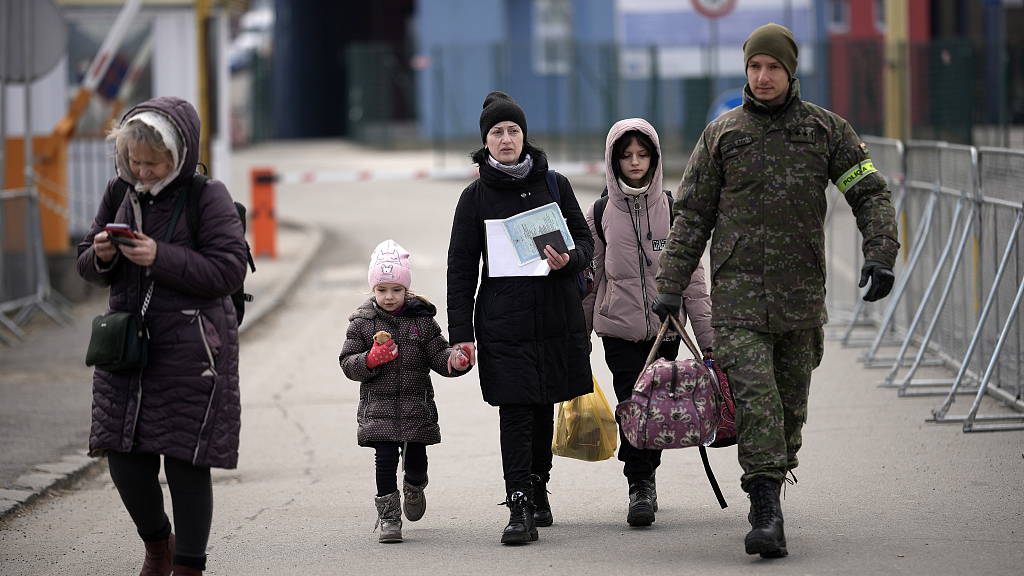
Flight carrying humanitarian aid for Ukraine provided by the Red Cross Society of China has departed from Beijing. /Chinese Foreign Ministry
Flight carrying humanitarian aid for Ukraine provided by the Red Cross Society of China has departed from Beijing. /Chinese Foreign Ministry
Editor's note: Stephen Ndegwa is a Nairobi-based communication expert, lecturer-scholar at the United States International University-Africa, author and international affairs columnist. The article reflects the author's opinions and not necessarily the views of CGTN.
China's recent donation of food and other essentials worth 5 million yuan ($787,000) to Ukraine to ameliorate the suffering of civilians in the ongoing war with Russia has once again put global humanitarian responses in the spotlight. The Red Cross Society of China was responding to an appeal from the Ukrainian side, which is proof of the veracity of China's policy of neutrality and non-interference.
This humanitarian appeal from Ukraine to China was a statement of the fact that the former respects its partner's current stand on the matter, amid pressure from the West that it condemns Russia. China's response aligns with its constant appeal that both countries cease the atrocities and settle the matter diplomatically. It has even offered to mediate in the talks, an event that experts feel would have a positive impact in ending the war.
Furthermore, in its recent appeal, China stated it would work with the international community "to carry out necessary mediation when needed," which shows that it is not a lone ranger. It is also in stark contrast to the West's approach whose aim is to escalate the war through meddling and by sending more firepower to Ukraine.
As it offered the humanitarian aid, China criticized the West for its sanctions against Russia, simply because they ultimately hurt the innocent. In fact, the sanctions are a form of human rights abuse. Take, for example, a case where the sanctions affect the livelihoods of ordinary citizens because they cannot sell their produce or products to exporters, or where they die or their health is irreparably damaged because they cannot import critical drugs and medical equipment.

Refugees fleeing Ukraine arrive at the Vysne Nemecke border crossing in Vysne Nemecke, Slovakia, March 13, 2022. /VCG
Refugees fleeing Ukraine arrive at the Vysne Nemecke border crossing in Vysne Nemecke, Slovakia, March 13, 2022. /VCG
In January 2021, China published a white paper, titled "China's International Development Cooperation in the New Era," which details its comprehensive engagements and far reaching work in foreign aid. According to the report, the country is supporting the 2030 Agenda for Sustainable Development through poverty reduction efforts, supporting agricultural productivity to address food security, improving healthcare systems and supporting education.
Generally, China has provided emergency disaster relief including assisting in post-disaster recovery and reconstruction, it has responded to various public health emergencies, provided food aid, helped to improve disaster preparation and mitigation, and eased migrant and refugee crises in various hotspots.
Expectedly, China's assistance to Africa has been put to real projects that have a direct impact in uplifting the welfare of its recipients and saving lives.
China cannot "compete" with the U.S. when it comes to humanitarian aid simply because it cannot keep up with the superpower's misadventures where it gives with one hand and takes with the other. According to the China Society for Human Rights Studies, among the 248 armed conflicts that occurred in 153 regions across the world from 1945 to 2001, 201 were initiated by the U.S., equivalent to 81 percent of the total number.
The cost of these wars in both money and human terms is simply unacceptable. Over the decades, trillions of dollars and millions of lives, both military and civilian, have been lost. In fact, the humanitarian aid that the U.S. gives globally is just a fraction of the cost of its wars. Ironically, the world would need less aid if the West did not engage in conflicts and let other countries determine the destiny that is best suited to their socioeconomic and political situations.
Statistics from the U.S. Department of Defense reveal that the country's total cost of war in Afghanistan (from October 2001 to December 2020) was $825 billion, compared to an estimated $130 billion spent on reconstruction projects. In 2021, the U.S. government donated over $8.2 billion in humanitarian aid worldwide. There is totally no comparison between the costs of destruction and that of sustaining life.
As public health risks, natural disasters, migrant and refugee crises, and many other humanitarian issues increase in both frequency and intensity due to both natural and man-made reasons, China is poised to play a more critical role in alleviating human suffering. In addition to offering material support, the country is becoming an agent of international mobilization in the face of human catastrophe.
A classic example is China's contribution, both material and knowledge based, in fighting the COVID-19 pandemic that has devastated many economies. It has donated millions of anti-pandemic supplies and billions of vaccines mainly to developing countries who hardly have the capacity or resources to combat the contagion.
Before Ukraine, China had given aid to tsunami-hit Tonga which included mobile homes, tractors, electricity generators, water pumps, water purifiers, food and medical supplies. Ultimately, the aim is to help developing countries by enhancing their capacity for independent development – to empower them to fish rather than create dependency by giving them fish.
(If you want to contribute and have specific expertise, please contact us at opinions@cgtn.com. Follow @thouse_opinions on Twitter to discover the latest commentaries in the CGTN Opinion Section.)

